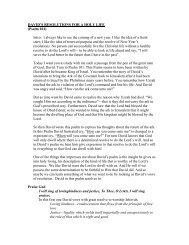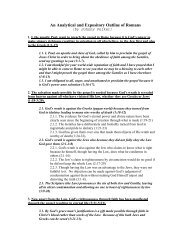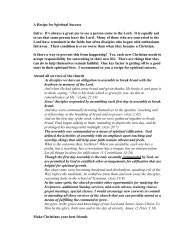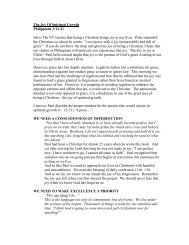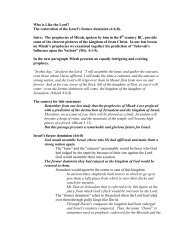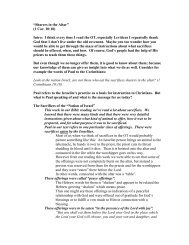Reminders for the Faithful (Titus 3:1-3) Intro: The ... - Truth Chasers
Reminders for the Faithful (Titus 3:1-3) Intro: The ... - Truth Chasers
Reminders for the Faithful (Titus 3:1-3) Intro: The ... - Truth Chasers
You also want an ePaper? Increase the reach of your titles
YUMPU automatically turns print PDFs into web optimized ePapers that Google loves.
faith should not be used as justification <strong>for</strong> disobedience to laws we<br />
simply don’t like. Governments can surely create hardships on people by<br />
demanding time-consuming paperwork, record keeping, licensing, etc.<br />
<strong>The</strong> Christian must resist <strong>the</strong> tendency to be rebellious and resentful<br />
toward such things; but instead show willing compliance with <strong>the</strong> law of<br />
<strong>the</strong> land, even when being inconvenienced. Our actions and reactions<br />
send a message to o<strong>the</strong>rs.<br />
Proper response to all men<br />
Be ready <strong>for</strong> every good deed<br />
<strong>The</strong> idea includes not only willingness but also <strong>for</strong>ethought<br />
Christians must have a mindset to be a participant in good things,<br />
ra<strong>the</strong>r than a bystander. This is especially true in areas where our<br />
involvement or lack of it may send a message to unbelievers about<br />
our commitment to principles we uphold.<br />
What message do we send when o<strong>the</strong>rs who know our<br />
profession of faith ask us to give to a worthy cause and we<br />
refuse?<br />
What message do we send when o<strong>the</strong>rs are working diligently<br />
to make needed changes in important social areas and we<br />
avoid participation at any level?<br />
Obviously we can’t be everything to everybody; but we should<br />
give careful thought to “how ready” we are to participate in<br />
good deeds <strong>for</strong> o<strong>the</strong>rs.<br />
Malign no one<br />
<strong>The</strong> word translates <strong>the</strong> word from which we get “blaspheme”. We<br />
usually use <strong>the</strong> word to speak of improper words toward God or<br />
spiritual things; but <strong>the</strong> word really means to “speak against”<br />
something. What we might call “bad mouthing” someone!<br />
Though <strong>the</strong>re is much about non-Christians that may be worthy of<br />
criticism, Paul urges Christians to manifest grace and generosity<br />
toward outsiders, perhaps especially to outsiders.<br />
Do we want to be seen as critical and condemning or gracious and<br />
<strong>for</strong>giving? I remember a gentle man who served in <strong>the</strong> postal service<br />
in Lawrenceburg, TN. His name was Teddy Crews. Through <strong>the</strong><br />
years he earned a reputation of kindness toward all people. At his<br />
death, numerous people in <strong>the</strong> community remarked that <strong>the</strong>y had<br />
never heard him say an unkind word to or about anybody!<br />
Be uncontentious, gentle, showing every consideration<br />
<strong>The</strong> first word “amoxos” referred to someone who did not fight in a<br />
battle. Thus, it meant “uncontentious”. <strong>The</strong> same word appears in<br />
<strong>the</strong> qualifications of an elder (“not a brawler”).<br />
In contrast Paul urges disciples to be “epieikeis”, that is, moderate,<br />
reasonable, or <strong>for</strong>bearing..<br />
showing every consideration <strong>for</strong> all men<br />
“to show perfect courtesy to all men” (RSV).



